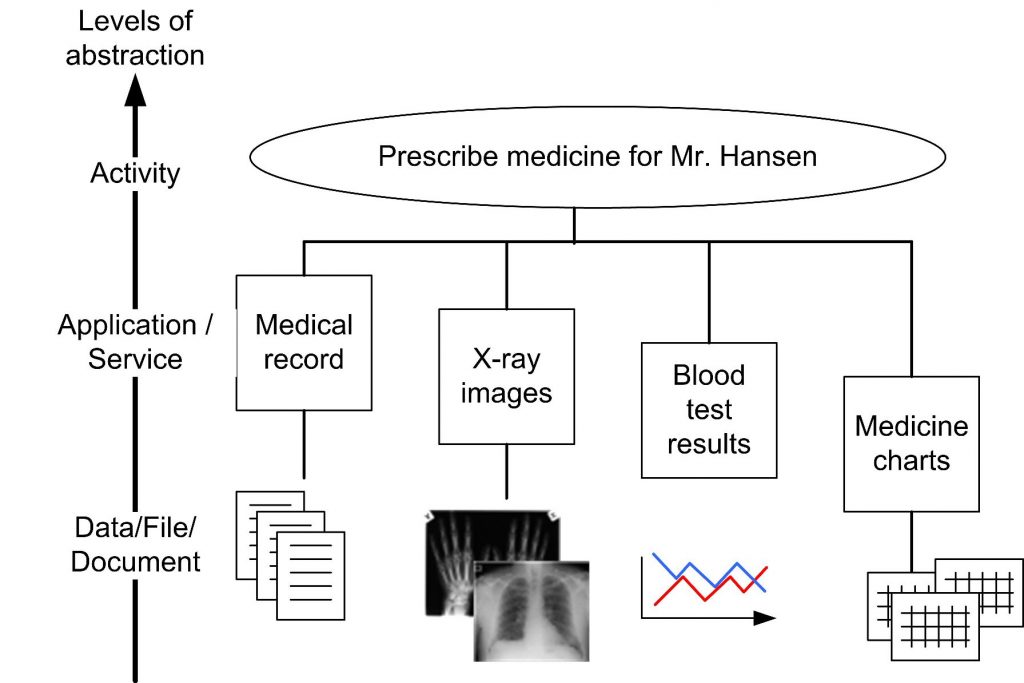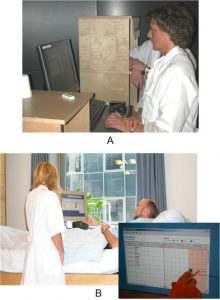The activity-based computing project [1] researched pervasive computing support for clinical hospital work. The aim was to design and evaluate technologies, which has the potential to support the mobile, collaborative, disruptive, and time-critical use of heterogeneous embedded device and computers in a hospital.
Most modern computer systems are typically single-user oriented and designed for personal office use – e.g. supporting individual tasks such as word processing while sitting at a desk. The concept of Activity-Based Computing (ABC) seeks to create computational support for human activities. The ABC approach was motivated by a number of studies of healthcare practices in hospitals [2, 3, 4, 5]. In a hospital, the challenges arising from the management of parallel activities and interruptions are amplified because multitasking is now combined with a high degree of mobility, collaboration, and urgency.


Healthcare has a long tradition of using computer-based systems, and clinicians are today faced with many different systems and with a wide range of functionality within each of these. Thus, carrying out a single activity typically involves a lot of different systems and a lot of specific functionality and data presentation within each system. This is illustrated in Figure 1. If you ask the doctor what he is doing, he would answer ”I’m prescribing medicine for Mr. Hansen”. If you instead view it from the computational level, the doctor is actually handling several distinct services or applications, as well as viewing and manipulating a substantial amount of medical data: reviewing the medical history, looking over the medicine schema, studying the results of blood tests, viewing X-ray images, etc. Thus, we can identify at least three levels of abstraction, namely the higher level of human activities (the ’activity level’), the lower level of computational services or applications being used (the ’application level’), and the lowest level of data, files, or material being manipulated (the ’data level’). Our key argument is that contemporary computing systems do not support the activity level, only the application or the data level. Our aim was therefore to explore how to support the activity level directly in the computing system; explore what the concept of ”activity” is in this context, and to evaluate how activities may help clinicians in their daily work.
The research provided the empirical and theoretical background for activity-based computing, its principles, a Java-based implementation of the ABC Framework, and an experimental evaluation together with a group of hospital clinicians [6]. The research contributed to a growing research on support for human activities, mobility, collaboration, and context-aware computing [7].
Partners
The partners involved the IT University of Copenhagen, the Department of Computer Science at the University of Aarhus, Aarhus University Hospital, and the companies Medical Insight (now Karos Health) and Systematic Software Engineering.
The original ABC homepage is (still) available at the University of Aarhus.
Funding & Time Period
 This research was funded byt the The Danish Council for Strategic Research from 2005–2009, grant no. #2106-04-0019.
This research was funded byt the The Danish Council for Strategic Research from 2005–2009, grant no. #2106-04-0019.
References
![[pdf]](https://www.bardram.net/wp-content/plugins/papercite/img/pdf.png)
[Bibtex]
@article{ieee_pvc:abc,
Address = {Los Alamitos, CA, USA},
Author = {Jakob E. Bardram and Henrik B. Christensen},
Doi = {http://doi.ieeecomputersociety.org/10.1109/MPRV.2007.19},
Journal = {IEEE Pervasive Computing},
Number = {1},
Pages = {44-51},
Pdf = {abc.pvc.printed.pdf},
Publisher = {IEEE Computer Society},
Tag = {abc,journal,phc},
Title = {Pervasive Computing Support for Hospitals: An Overview of the Activity-Based Computing Project},
Url = {http://doi.ieeecomputersociety.org/10.1109/MPRV.2007.19},
Volume = {6},
Year = {2007},
Bdsk-Url-1 = {http://doi.ieeecomputersociety.org/10.1109/MPRV.2007.19}}[Bibtex]
@article{jcscw2005:bardram,
Author = {Jakob E. Bardram and Claus Bossen},
Issn = {0925-9724},
Journal = {Computer Supported Cooperative Work.},
Number = {2},
Pages = {131--160},
Publisher = {Kluwer Academic Publishers},
Tag = {journal},
Title = {{Mobility Work - The Spatial Dimension of Collaboration at a Hospital}},
Url = {http://dx.doi.org/10.1007/s10606-005-0989-y},
Volume = {14},
Year = {2005},
Bdsk-Url-1 = {http://dx.doi.org/10.1007/s10606-005-0989-y}}[Bibtex]
@inproceedings{ecscw2003:bardram,
Address = {Helsinki, Finland},
Author = {Jakob E. Bardram and Claus Bossen},
Booktitle = {Proceedings of the Eighth European Conference on Computer Supported Cooperative Work},
Editor = {Kari Kuutti and Eija Helena Karsten and Geraldine Fitzpatrick and Paul Dourish and Kjeld Schmidt},
Month = Sep,
Pages = {355--374},
Publisher = {Kluwer Academic Publishers},
Tag = {conference},
Title = {{Moving to get aHead: Local Mobility and Collaborative Work}},
Url = {http://www.springerlink.com/index/06FDA65UQC4VTYQN},
Year = 2003,
Bdsk-Url-1 = {http://www.springerlink.com/index/06FDA65UQC4VTYQN}}[Bibtex]
@inproceedings{group2005:bardram_2,
Address = {New York, NY, USA},
Author = {Jakob E. Bardram and Claus Bossen},
Booktitle = {GROUP '05: Proceedings of the 2005 international ACM SIGGROUP conference on Supporting group work},
Isbn = {1-59593-223-2},
Location = {Sanibel Island, Florida, USA},
Pages = {168--176},
Publisher = {ACM Press},
Tag = {conference},
Title = {A web of coordinative artifacts: collaborative work at a hospital ward},
Url = {http://doi.acm.org/10.1145/1099203.1099235},
Year = {2005},
Bdsk-Url-1 = {http://doi.acm.org/10.1145/1099203.1099235}
}![[pdf]](https://www.bardram.net/wp-content/plugins/papercite/img/pdf.png)
[Bibtex]
@inproceedings{bardram:2011,
author = {Bardram, Jakob E and Doryab, Afsaneh},
title = {Activity analysis: applying activity theory to analyze complex work in hospitals},
booktitle = {Proceedings of the ACM 2011 conference on Computer supported cooperative work},
series = {CSCW '11},
year = {2011},
isbn = {978-1-4503-0556-3},
location = {Hangzhou, China},
pages = {455--464},
numpages = {10},
url = {http://doi.acm.org/10.1145/1958824.1958895},
doi = {http://doi.acm.org/10.1145/1958824.1958895},
acmid = {1958895},
publisher = {ACM},
address = {New York, NY, USA},
keywords = {activity analysis, activity theory, activity-aware computing, context-aware computing, hospitals, surgery},
tag={conference,abc,phc},
pdf={pr290-bardram.pdf},
}![[pdf]](https://www.bardram.net/wp-content/plugins/papercite/img/pdf.png)
[Bibtex]
@article{tochi2009:bardram,
Address = {New York, NY, USA},
Author = {Bardram, Jakob E.},
Date-Added = {2009-06-12 00:41:31 +0200},
Date-Modified = {2009-06-12 00:42:04 +0200},
Doi = {10.1145/1534903.1534907},
Issn = {1073-0516},
Journal = {ACM Transactions on Computer-Human Interaction},
Number = {2},
Pages = {1--36},
Publisher = {ACM},
Tag = {abc,journal,phc},
Title = {Activity-based computing for medical work in hospitals},
Url = {http://doi.acm.org/10.1145/1534903.1534907},
Volume = {16},
Year = {2009},
Bdsk-Url-1 = {http://doi.acm.org/10.1145/1534903.1534907}}![[pdf]](https://www.bardram.net/wp-content/plugins/papercite/img/pdf.png) J. E. Bardram, “A Novel Approach for Creating Activity-Aware Applications in a Hospital Environment,” in Human-Computer Interaction – INTERACT 2009, 2009, p. 731–744.
J. E. Bardram, “A Novel Approach for Creating Activity-Aware Applications in a Hospital Environment,” in Human-Computer Interaction – INTERACT 2009, 2009, p. 731–744. [Bibtex]
@inproceedings{LNCS57270731,
Author = {Jakob E. Bardram},
Booktitle = {Human-Computer Interaction -- INTERACT 2009},
Date-Added = {2009-08-26 11:16:09 +0200},
Date-Modified = {2009-08-26 17:18:46 +0200},
Editor = {Tom Gross and Jan Gulliksen and Paula Kotz\'{e} and Lars Oestreicher and Philippe Palanque and Raquel Oliveira Prates and Marco Winckler},
Isbn = {978-3-642-03657-6},
Location = {Heidelberg},
Pages = {731--744},
Pdf = {act.aware.interact2009.printed.pdf},
Publisher = {Springer},
Series = {Lecture Notes in Computer Science},
Tag = {abc,conference,jcaf},
Title = {A Novel Approach for Creating Activity-Aware Applications in a Hospital Environment},
Volume = {5727},
Year = {2009}}
